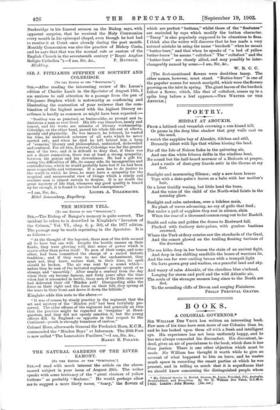SIR J. FITZJAMES STEPHEN ON SOUTHEY AND COLERIDGE.
[To THE EDITOR OF THE " SPECTATOR." .1 SIR,—After reading the interesting review of Mr. Lucas's edition of Charles Lamb in the Spectator of August 15th, I am anxious to call attention to a passage from the pen of Fitzjames Stephen which is noteworthy as confirming and illustrating the contention of your reviewer that the com- bination of the highest moral with the highest literary ex- cellence is hardly as common as might have been expected :— " Southey was as punctual, as businesslike, as prompt and in- dustrious a man as ever lived. His life was blameless, manly and honest, and his works are miracles of literary workmanship. Coleridge, on the other hand, passed his whole life out at elbows, morally and physically. He was inexact, he loitered, he wasted his time, he undertook schemes of all sorts which he never carried out; and when he died he left behind him a heap of •remains,' literary and philosophical, unfinished, dishevelled and confused. For all this, however, Coleridge was far the greater man of the two; and it is difficult to deny that, if there was not a direct connection, there was at least a strong sympathy, between his genius and his slovenliness. He had a gift for seeing the difficulties of life, its seamy side, its incongruities and contradictions, which he would probably have lost if lie had been more respectable and victorious. If a man has to do justice to the world in which he lives, he must have a sympathy for the sceptical and unsuccessful view of things which a sturdy and resolute man is almost certain to despise. It is no doubt the great mystery of life that, whenever any good quality is traced up far enough, it is found to involve bad consequences."
Hotel Sonnenberg, Engelberg.






































 Previous page
Previous page